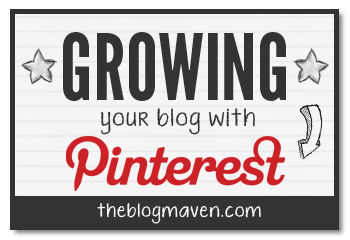Leave a Comment:
10 comments
Hi Jeni, you have such a nice and informative space here! Found you via … Pinterest 🙂 and had to say Hi. Off to follow you now.
ReplySure, it’s about the same thing. The difference is, since Pinterest is more one-sided (and less of a “conversation”), you establish yourself as an authority by being “in the know” and having a big imbalance between your followed (ideally low) and followers (ideally high). You establish a trend of having good taste from the beginning and then at a certain point, this will accelerate the growth of your following.
ReplyHi Jane, thanks for your comment. I agree with you completely about republishing someone else’s work…but I’m not sure I understand exactly where you’re coming from. Do you think it’s unethical to share someone’s post via Twitter or Facebook without their permission as well? I know there are people who don’t want their images shared, but thankfully there are some tools like Pinterest Block that authors can use to prevent people from sharing. And there’s always the option of stating explicitly on your site (or within a post) that you don’t want things shared, as well. Could you expand on what you mean a bit? It’s something I might write about, if there’s a really solid case for it. Thanks!
ReplyAs you know when you upload content to Pinterest, ie pin someone’s image, you publish an image to the site. With everything you pin you are stating that you are the “sole and exclusive owner of all member content” and further that you have a “worldwide, irrevocable, perpetual, non-exclusive, transferable, royalty-free license.” (Pinterest TOS) Some website owners/bloggers who pay money for photographers so that their site content looks awesome, along with the said photographers, may not be too happy about that, particularly as Pinterest can sell that image (admittedly this is pretty unlikely according to Ben Silbermann). Furthermore, work is protected by copyright with or without a watermark image or attribution, regardless if whether it is published on a website – in layman’s terms, if you didn’t take the picture you don’t own the picture! Providing a link and correct attribution is questionable at best as to whether or not that satisfies copyright law requirements. Also, in my opinion, the onus is NOT on a website owner to encode their sites to discourage (or not allow) pinning (presumably a tenuous legal argument should it ever get that far)- the onus is on the Pinterest user to ascertain whether they have the rights to pin that person’s work (ie ASK the owner!). Many examples are out there on Pinterest where the photo does not link back to the original site, or where that site has expired (which would not be as much of an issue if the pinner asked permission to pin and the owner granted permission making certain provisos, particularly regarding correct links/attribution…) Therefore Pinterest is unlike sharing/RTing on Facebook and twitter respectively (as you suggested) as no such TOS exist on either of those social media services. (Although the case could be argued that uploading images of another person’s work to facebook without their permission is also therefore a breach of copyright…)
A very concerning aspect of Pinterest (and this is a whole other story/problem so feel free to write abour this too) is the sponsored sites (ie people get PAID) to post images of someone’s work; pin hungry pinners are led to such sites, they pin the images from such sites and Pinterest then directs traffic to these sites. Why or why do people continue to do this. (I refuse to name such sites here at risk of driving even more traffic to them, but they do exist and people are making money from them – ie making money from other people’s hard work) and Pinterest users continue to support this… Not cool I say!
Anyway, I’m no solicitor – I just don’t like seeing my work all over Pinterest without any link to it for people to do what they like with.
Jane
Reply
 In the process of pinning your favorite bits of the web on Pinterest, you’ll inevitably come across items other people have pinned. And if you like these pins, the logical thing to do for yourself (and your own followers!) is to repin them on your own pin board. But how can this help you grow the readership on your own blog?
In the process of pinning your favorite bits of the web on Pinterest, you’ll inevitably come across items other people have pinned. And if you like these pins, the logical thing to do for yourself (and your own followers!) is to repin them on your own pin board. But how can this help you grow the readership on your own blog? When you click on an individual pin, you’ll get a pop-up with the image of that pin plus a lot of other information about it (just beneath the image). The first box is called “Pinned onto the board…” and at a glance, you can tell whether you like the other pins on that board. If they’re right up your alley, you’d probably want to start following that pinner anyway.
When you click on an individual pin, you’ll get a pop-up with the image of that pin plus a lot of other information about it (just beneath the image). The first box is called “Pinned onto the board…” and at a glance, you can tell whether you like the other pins on that board. If they’re right up your alley, you’d probably want to start following that pinner anyway.

